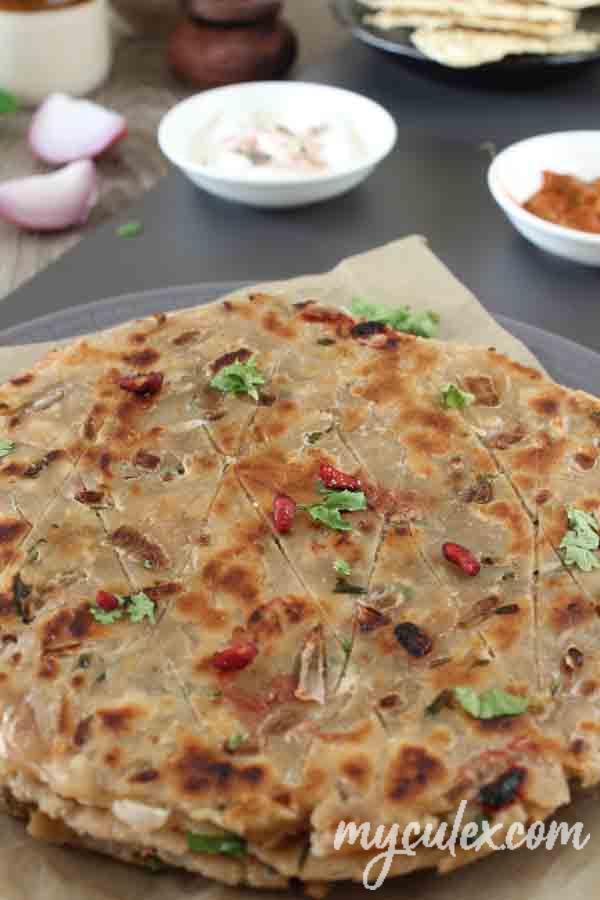
Authentic Sindhi Koki
Jump to Video Jump to Recipe
Authentic Sindhi Koki | Pyaaz Ki Koki | Sindhi Koki Recipe | Baser ji Koki | Onion Flatbread | Sindhi Koki Breakfast | Authentic Sindhi Recipe | How to make Sindhi Koki at Home with step by step instructions and video
Updated on 31st August 2024
Authentic Sindhi Koki is a popular Sindhi breakfast. It is a type of aromatic thick flatbread or paratha. Though traditionally, it is enjoyed as a wholesome breakfast, this onion flatbread also makes a good option for brunch or lunch.
Whole wheat flour, onions, oil and other spices are combined together to form a dough. All these impart a uniqueness to this Sindhi Koki Recipe.
Making Koki comes naturally to me. It has been years that I have been making it not just for breakfast but also frequently packed in lunch boxes for my son, my husband and myself (during my time in the corporate sector and later as a school teacher. I have made it for weekend travels or outings.
The delectable flavor of Koki has recently elevated it to a favorite breakfast choice on many food counters’ menus. With changing times, size and thickness of Koki and the amount of oil/ghee has reduced, without compromising on the taste.
I am sure you will like this authentic heirloom recipe!
Some Flabread recipe links on this blog
Why should you make
- Satisfying, Aromatic and wholesome
- Versatility –Can be served for breakfast or meal menu. . It pairs well with yogurt, pickles, curries, or even tea.
- Easy to make and requires few ingredients
- Stays good for 1-2 days. Hence good option for lunch boxes or travel.
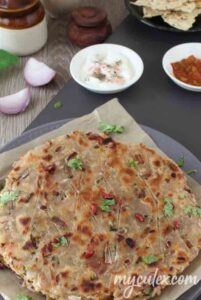
What is Pyaaz Ki Koki / Baser ji Koki
Authentic Sindhi Koki is a traditional aromatic flatbread from the Sindhi cuisine. Koki is made with whole wheat flour, onions, coriander leaves, green chilies, oil and some basic spices. A dough is made using water sparingly. It is then rolled out into small discs, each known as koki.
Baser in Sindhi denotes Onion. This post today is about Onion Koki. There is another Koki variation without onion.
Sindhi Koki is often enjoyed for breakfast, served with yogurt, pickles, or alongside tea.
links
Ingredients
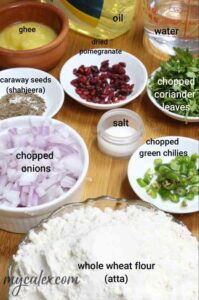
For Measurements refer to the RECIPE CARD further below.
- Wholewheat flour
- Onions – red or yellow onions variety
- Coriander leaves – recommended
- Green chilies
- Spices– Salt , caraway seeds (shahjeera, pullav jeeri)) Water to make dough
How To Make Authentic Sindhi Koki
How to make Dough for Koki
1. Firstly, take whole wheat flour in a wide shallow mixing bowl. Traditionally, we make various kinds of dough in a metallic paraad.
2. Add the chopped onions, green chilli, caraway seeds (pullav jeeri), coriander leaves, salt, and dried pomegranate arils. (I have added dried pomegranate arils to the dough later.)
3. Make a well in the centre of the flour and pour the oil.(You could use ghee or combination of ghee and oil.
4. Gently rub the oil and flour and mix all the ingredients till a crumbly texture is formed. An indication of good crumbly texture is that you can feel the oiliness on your palms . Important: The oil incorporated into the flour and other ingredients at this stage is the deciding factor of taste.This is what makes Koki different from a Paratha. Excess of oil and less of oil both can ruin Koki’s taste.
5. Add water a little at a time to the crumbly textured dough and form a stiff firm pliable dough.
6. Divide the dough into each portions and dab them with dried pomegranate arils. I have added the arils now in this step since they were not completely dried and hence could taint the entire dough. If you have absolutely dried pomegranate aril, free to add in step 2 itself.
7. Cover and set aside the dough for at least ten minutes.
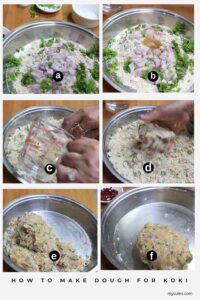
How to Roll out Sindhi Koki
8. Divide dough into equal size portions. Roll each portion halfway. Then lightly roast it on a tawa/griddle till it firms up a bit. Flip and similarly lightly roast the other side.
9. Transfer this Koki that is lightly roasted onto a rolling board. Let the steam escape and within less than a minute roll it out completely to 4” to 5”. The koki is slightly thicker as compared to a roti. While rolling do not lift the Koki often like a roti, lest it will break.
Authentic method: is to roll Koki halfway through, and just lightly roast on the griddle. Then roll out completely , make diagonal markings crisscrossing each other.or prick with a fork. This step ensures that the Koki is uniformly cooked and crisp throughout. Step is recommended but not mandatory.
Easy method: Alternatively , you could directly roll out the koki completely, make markings and process to roast.
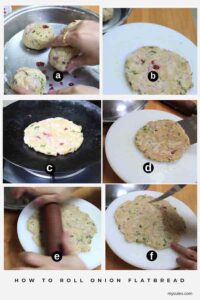
How to cook/roast Sindhi Koki
10.Transfer the Rolled out Koki to a warm griddle with the markings side facing down. Roast on medium flame till brown spots appear on the lower side.
11. Make similar markings on the side facing you. Then flip and cook on this side. Now brush ghee or oil or their combination on both the side.
12. Cook till the Koki is lightly golden brown and crisp.
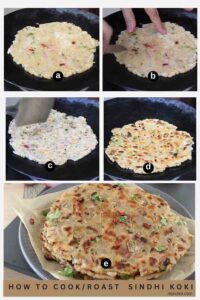
What to serve with
Serve warm with curd, boondi vegetable raita , papad or pickle alongwith a glass of chilled Mint Lassi or Boondi Chaach.
You may also enjoy with just a cup of Karak Chai
Storage:
Sindhi Koki tastes best when eaten warm. Nevertheless, it is an ideal choice as a travel food or packed food. Stays good outside for a day. You can store in fridge for 1-2 days. Reheat it before consumption.
Tips for Perfect Onion Koki
- Roast Koki on medium flame. Do not rush through the cooking/roasting.
- Koki can be roasted ahead till three fourth done. Complete the process just before serving.
- For an authentic flavor, use the ingredients mentioned in the recipe. However you could try variations by adding kasuri methi or carom seeds, red chili flakes to the dough.
Pin for Later
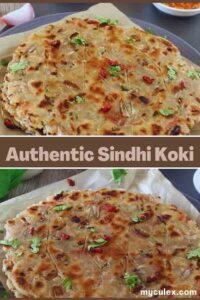
FAQ
Why the dough splits while rolling
You have used excess oil or ghee as shortening. To rectify, add some flour.
Why does the koki look like a paratha
Not enough shortening (moyan) is used and the dough is soft.
Is Koki vegan
Traditionally ghee, solely or combined with oil, is used in Koki. For vegan version use only any vegetable oil.
Recipe Card
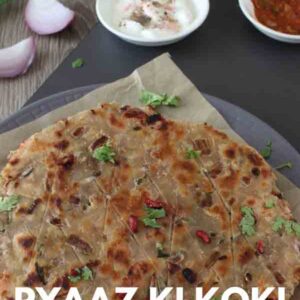
Authentic Sindhi Koki
Equipment
- shallow wide metallic vessel
- griddle
- metallic spatula
- rolling pin and board
Ingredients
- 1.5 cup whole wheat flour 225gm
- 1/8 cup oil for shortening; moyan. 45 gm
- 1 medium onion finely chopped; 80 gram
- 2 green chilies finely chopped
- 1/8 cup coriander leaves finely chopped
- 1 tsp dried pomegranate arils dried anardhana ; optional
- ¼ tsp caraway seeds shahjeera, pullav jeeri optional
- 1 tsp salt OR adjust to taste
- 1/4 cup water for making dough; adjust
- oil – ghee for brushing on Koki
Instructions
How to make Dough for Koki
- Firstly, take whole wheat flour in a wide shallow mixing bowl.
- Add the chopped onions, green chilli, caraway seeds (pullav jeeri), coriander leaves, salt, and dried pomegranate arils. (I have added dried pomegranate arils to the dough later.)
- Make a well in the centre of the flour and pour the oil. (You could use ghee or combination of ghee and oil)
- Gently rub the oil and flour and mix all the ingredients till a crumbly texture is formed. Refer to detailed explanation above in the post.
- Add water a little at a time to the crumbly textured dough and form a stiff firm dough.
- Divide the dough into equal portions and dab them with dried pomegranate arils. Refer to detailed explanation above in the post.
- Cover and set aside the dough for at least ten minutes.
How to Roll Sindhi Koki
- Divide dough into equal size portions. Roll each portion halfway. Then lightly roast it on a tawa/griddle till it firms up a bit. Flip and lightly roast the other side in the same manner.
- Transfer this Koki that is lightly roasted onto a rolling board. Let the steam escape and within less than a minute roll it out completely till 4” to 5” in diameter. The koki is thicker as compared to a roti. While rolling do not lift the Koki often like a roti, lest it break.
- Once rolled completely, make diagonal markings crisscrossing each other or some prick with a fork. his step ensures that the Koki is uniformly cooked and crisp throughout. This is recommended but not mandatory
- Alternatively, you could directly roll out the koki completely, make markings and procees to roast.
How to cook/roast Sindhi Koki
- Transfer the Rolled Koki on a warm griddle with the markings side facing down. Roast on medium flame till brown spots appear on the lower side.
- Make similar markings on the side facing you. Then flip and cook on this side. Now brush ghee or oil or their combination on both the side. Cook till the Koki is lightly golden brown.
- Serve warm with curd and papad.
Video
Notes
- Roast Koki on medium flame. Do not rush through the cooking/roasting.
- Koki can be roasted ahead till three fourth done. Complete the process just before serving.
- For an authentic flavor, use the ingredients mentioned in the recipe. However, you could try variations by adding kasuri methi or carom seeds, red chili flakes to the dough.
If you have liked video, do Subscribe to My Culinary Expressions YouTube Channel for more interesting videos.
Do leave a feedback below in the COMMENTS SECTION or my FACEBOOK PAGE.
You can follow me on Facebook, Pinterest, Twitter or Instagram
Thank you for stopping by my blog. Your feedback and comment is much appreciated. Hope you have enjoyed reading this post. Do not forget to Rate, Comment and Subscribe to our Newsletter.
Soon, I shall be back with another interesting post.
Until then
Stay Bright!










[…] during the entire week is a conglomerate of Methi Lehsun Paratha, Schezwan Paneer Paratha, Koki, Dal Pakwan, Dosa, Idli, Upma and now the […]
[…] Fortunately, there has always been a wide range of breakfast recipes on our menu to choose from such as Methi Lehsun Paratha, Schezwan Paneer Paratha, Za’ater Cheese Manakish, Paneer Frankie, Veggie Stuffed Homemade Buns or Sindhi Koki. […]
[…] popular recipes from Sindhi Cuisine are Koki, Tairi, Sindhi Kadhi Chawal, Khatto bhath, Sai Mashale mein Patata, Sai Bhaji, Bhuga […]
[…] Sindhi Koki […]
[…] Sindhi Koki […]